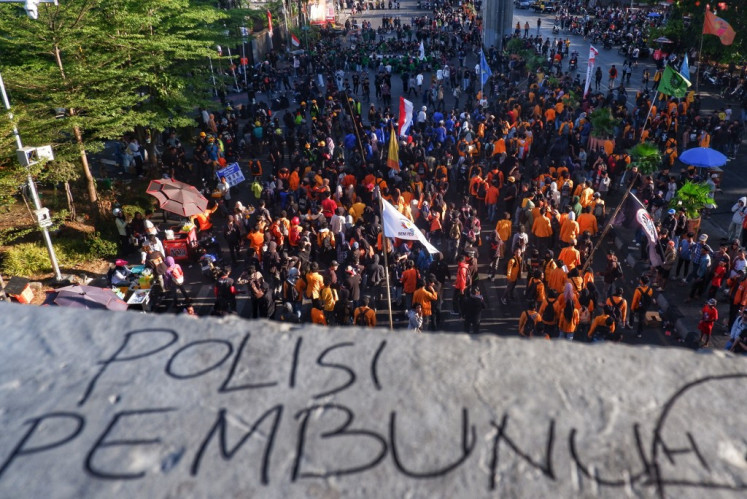Popular Reads
Top Results
Can't find what you're looking for?
View all search resultsPopular Reads
Top Results
Can't find what you're looking for?
View all search resultsCourt rules recording can’t be used against Golkar chief
Golkar Party chairman Setya Novanto can breathe a sigh of relief after the Constitutional Court ruled on Wednesday that a recorded conversation he had with a politically wired tycoon and a former PT Freeport Indonesia president director can not be used as evidence against him
Change text size
Gift Premium Articles
to Anyone
G
olkar Party chairman Setya Novanto can breathe a sigh of relief after the Constitutional Court ruled on Wednesday that a recorded conversation he had with a politically wired tycoon and a former PT Freeport Indonesia president director can not be used as evidence against him.
The court argued that wiretapping was against the Constitution and could not be used as evidence unless it was carried out by law enforcers and in accordance with prevailing regulations. “When law enforcers use evidence that is obtained through illegal means, then the evidence can be disregarded by a judge and considered to have no value by the court,” justice Manahan Sitompul said.
Setya previously asked the court to provide a legal interpretation for the phrase “electronic evidence” in the 2008 Electronic Information and Transactions (ITE) Law.
The former House of Representatives speaker argued that the law did not make it clear whether electronic material obtained through illegal means could be used as evidence to charge someone with a crime.
The court accepted his judicial review petition, saying electronic evidence has no legal standing if it was obtained illegally.
Also on Wednesday, the court accepted Setya’s judicial review petition that the court scrap the phrase pemufakatan jahat (malevolent conspiracy) in the 2001 Corruption Law and the Criminal Code (KUHP).
The court argued that the phrase “malevolent conspiracy” was too vague and could be interpreted differently by different parties. This, it said, could lead to a violation of a person’s constitutional rights.
“Therefore, the Corruption Law must clearly define and mention the elements of [the phrase] malevolent conspiracy,” Manahan said. Setya filed the judicial review requests following a revelation of a controversial taped conversation between him, business tycoon Muhammad Riza Chalid and former Freeport Indonesia president director Maroef Sjamsoeddin in which Setya allegedly sought to acquire shares in the gold and copper mining company.
The conversation was taped by Maroef, who later handed the recording to the Attorney General Office (AGO) for investigation. The AGO said it was planning to charge Setya with conspiracy.
The probe, however, has been halted as the AGO claimed that it could not summon Riza.
Maroef also reported Setya to the House’s ethics council, which later held hearings to openly play the recording, which reportedly revealed that Setya claimed to have obtained permission from both President Joko “Jokowi” Widodo and Vice President Jusuf Kalla for the Freeport shares.
The uncovering of the controversial tape led to Setya giving up the House speakership due to massive pressure from the House’s ethics council as well as from the public.










